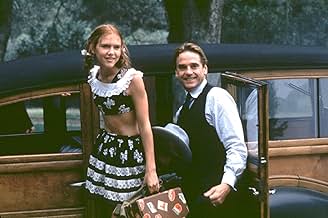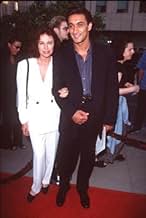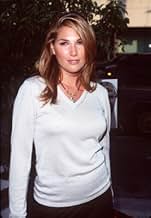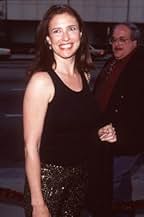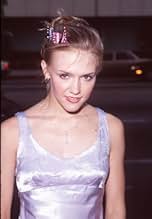Un hombre se casa con la propietaria de una vivienda para poder aprovecharse de su hija.Un hombre se casa con la propietaria de una vivienda para poder aprovecharse de su hija.Un hombre se casa con la propietaria de una vivienda para poder aprovecharse de su hija.
- Dirección
- Guionistas
- Elenco
- Premios
- 2 premios ganados y 4 nominaciones en total
Pat Pierre Perkins
- Louise
- (as Pat P. Perkins)
Emma Griffiths Malin
- Annabel Lee
- (as Emma Griffiths-Malin)
- Dirección
- Guionistas
- Todo el elenco y el equipo
- Producción, taquilla y más en IMDbPro
Opiniones destacadas
When the 1997 version of Lolita was widely censored in the US, many asked why the reaction was so strong to this film. After all, the novel was published in the US in 1958, Kubrick's film version appeared in 1962, and we hear more shocking tales of sexual depravity every day on the daytime talk shows. But after seeing Lyne's brilliant version of Lolita, I can see how he manages to breathe fresh controversy into this familiar story. Lyne's lascivious lens eroticizes Lolita's every movement and pose. The viewer is forced to see her through the eyes of Humbert and to feel his obsession and desire. We are co-conspirators in his crime, and at the end we share his shame. Rather than shocking us (and having us pull away in revulsion), Lyne draws us in and makes us face the Humbert in ourselves. This is an incredibly powerful film.
I implore you to read the book before watching the movie, and then you'll understand that it isn't glorifying anything. Yes the movie's aesthetic is beautiful. There are nice shots of the US and Lolita's style is pretty. But the story is nothing short of sick. Humbert is not meant to be the hero. He is an insanely sick and twisted. The author mocks him many times in the book. The story is told from his perspective which is interesting, but he is not a trustworthy narrator. He justifies his actions when in reality we see how they start to pile up on him and not work out in his favour. He is selfishly trying to pursue a fantasy, and putting adult expectations on a literal child. Lolita is manipulative, but she never stood a chance. She was failed by the adults around her. And she was dealing with a lot. Her father is nowhere to be found and we see how Humbert inserts himself into that role to abuse her. The aftermath of the characters, revealed right before the credits, is tragic. The actors delivered amazingly. And the poetic writing from the book is used throughout. This is a messed up story told from the perspective of a pathetic individual, but has elements of dark humour. We can see we are not supposed to root for Humbert. I think it was a great adaptation of the book.
Lyne's point of departure from the Kubrick version of Nabokov's great novel lies primarily in tone: the later version focuses more on the tragic, dramatic elements of the book and less on the comedic ones. I will not go so far as to suggest that Lyne made a better film; he did not. I do think, however, that he did pinpoint one of the key components of the novel's genius: a capturing of life on the newly paved highways of mid-century America. As Humbert, Jeremy Irons is as good as his predecessor James Mason. Frank Langella's interpretation of Quilty entirely diverges from the one given by Peter Sellers (and rightfully so; who wants to compete with Sellers?). But it is Dominique Swain, outdoing Sue Lyon, who comes closer than what ever seemed possible to embodying the essence of the doomed Dolly Haze.
The Author would be dismayed, and precisely because the story is so faithful to the book. But the story in the book was incidental, just something on which Nabokov could hang his layered challenges to concepts of narrative. The narrator is crazy, overly colors and outright lies. The story never fully exists in the book at all, and such as it does one can never be sure what is true and what imagined. Humbert is a made up name (as are all names) and clearly the narrator makes up most of the elements of his own character as well (European, Professor, Author... obviously a joke by the narrator on Nabokov).
In this film, everything makes sense, exactly the opposite of the reason the book exists. This is a beautiful film, with lovely detailed cinematography, good acting and great score, and all to solidify something that Nabokov created such that it could not be so. I believe that Peter Greenaway could make a good film of Lolita, and that he would have the courage to make it confusing and unerotic and unresolved. Why does Dolores' fate have to change in the film's epilogue? Because it ties up every last loose end. On Christmas Day no less!
(The real scandal is not that audiences/censors are shocked by prurient subjects, but that they take one of the greatest literary achievements ever and make it "explainable." Is this the only thing we can accept?)
But take the film on its own presumption that the book's story is what matters. This Lolita is too old, too pretty and sexy, too controlling. Irons is clearly narrowly channeled here and he is smart enough to know it: his frustration with the unimaginative stance of the film translates to a frustrated Humbert. I think Melanie is just right (just because HH calls her a cow means nothing). HH's violence with his previous wife should have been mentioned; her running away with the Russian cabbie is as much a setup for the Lolita fixation as the childhood dalliance, and better justifies the angst of loss. There should have been a few butterflies, and some explanation about the play: that it was written to allude to that first night at the hotel.
I highly recommend the audio tape version of Lolita. It is read by (guess...) Jeremy Irons! What he brings to the audio tape is the voice and phrasing of a man in a cell continually going over things in his own mind, embellishing and exaggerating and confusing and speculating and sometimes not at all sure about any of it. He brings this same voice to the voiceovers in the film, but it conflicts with the images which purport to represent a narrative stance of "real truth".
In this film, everything makes sense, exactly the opposite of the reason the book exists. This is a beautiful film, with lovely detailed cinematography, good acting and great score, and all to solidify something that Nabokov created such that it could not be so. I believe that Peter Greenaway could make a good film of Lolita, and that he would have the courage to make it confusing and unerotic and unresolved. Why does Dolores' fate have to change in the film's epilogue? Because it ties up every last loose end. On Christmas Day no less!
(The real scandal is not that audiences/censors are shocked by prurient subjects, but that they take one of the greatest literary achievements ever and make it "explainable." Is this the only thing we can accept?)
But take the film on its own presumption that the book's story is what matters. This Lolita is too old, too pretty and sexy, too controlling. Irons is clearly narrowly channeled here and he is smart enough to know it: his frustration with the unimaginative stance of the film translates to a frustrated Humbert. I think Melanie is just right (just because HH calls her a cow means nothing). HH's violence with his previous wife should have been mentioned; her running away with the Russian cabbie is as much a setup for the Lolita fixation as the childhood dalliance, and better justifies the angst of loss. There should have been a few butterflies, and some explanation about the play: that it was written to allude to that first night at the hotel.
I highly recommend the audio tape version of Lolita. It is read by (guess...) Jeremy Irons! What he brings to the audio tape is the voice and phrasing of a man in a cell continually going over things in his own mind, embellishing and exaggerating and confusing and speculating and sometimes not at all sure about any of it. He brings this same voice to the voiceovers in the film, but it conflicts with the images which purport to represent a narrative stance of "real truth".
I never read Nabokov's novel nor did I watch Kubrick's Lolita, but I liked this one - yes, my feelings sometimes were ambivalent regarding some scenes, but well, I guess that was Nabokov's aim and that of the director. Production is excellent, acting too. A good one that questions in its best moments our perception of reality and our moral values.
¿Sabías que…?
- TriviaAs Dominique Swain was a minor at age 15 when the movie was filmed, an adult body double had to be used for most of the sex scenes.
- ErroresCharlotte threatens to "ground" Lolita. Though the term was known to airmen it would not assume its current familiar meaning for many years.
- Citas
[first lines]
Humbert: [voiceover] She was Lo, plain Lo, in the morning, standing four feet ten in one sock. She was Lola in slacks, she was Dolly at school. She was Dolores on the dotted line. But in my arms she was always - Lolita. Light of my life, fire of my loins. My sin. My soul.
[whispered]
Humbert: Lolita.
- Créditos curiososAfter the credits are over there is a brief clip where Lolita is shown juggling a red apple.
- Versiones alternativasThe film was slightly cut to avoid a 'Not under 18' rating in Germany. An uncut version has been released on video.
Selecciones populares
Inicia sesión para calificar y agrega a la lista de videos para obtener recomendaciones personalizadas
- How long is Lolita?Con tecnología de Alexa
Detalles
Taquilla
- Presupuesto
- USD 62,000,000 (estimado)
- Total en EE. UU. y Canadá
- USD 1,071,255
- Fin de semana de estreno en EE. UU. y Canadá
- USD 19,492
- 26 jul 1998
- Total a nivel mundial
- USD 1,071,255
- Tiempo de ejecución2 horas 17 minutos
- Color
- Mezcla de sonido
- Relación de aspecto
- 1.85 : 1
Contribuir a esta página
Sugiere una edición o agrega el contenido que falta


